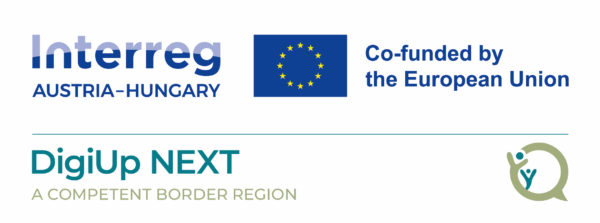
DigiUp NEXT
Digital skills in career orientation
Digital skills in career orientation
| Title | Strengthening the digital skills of young people in career orientation with a focus on professions in the IT sector |
| Acronym |
DigiUp NEXT |
| Topics |
Digital skills, new IT professions, educational and career orientation, pre-vocational training with new technologies |
| Period |
01.04.2024 – 30.09.2026 |
| Funding Program | INTERREG VI-A Austria-Hungary 2021-2027 |
| Partnership |
|
| Strategic Partners |
|
Short description:
With DigiUp NEXT, a follow-up project to DigiUp 4.0, the project partnership aims to strengthen young people’s digital skills and to support the use of innovative technologies in career orientation.
The project focuses on IT professions, as the rapid spread of digital innovations is changing this occupational field significantly and creating new professions and jobs at the same time.
In addition to programmers, software developers and system administrators, professions such as data miner, process automation manager and cyber security specialist have also emerged, which the project will draw attention to.
Offers & activities for Viennese schools (grades 7-9):
- 3 training concepts for career orientation and IT professions, taking into account new technologies such as virtual reality and augmented reality.
- IT equipment for 3 pilot schools in Vienna
- 6 train-the-trainer workshops for teachers
- 6 career orientation workshops for young people
- 2 excursion days for school professionals from Austrian and Hungary
- 1 careers information brochure for young people
- 1 online tool with quizzes about IT professions & 1 digital knowledge platform
- 1 career orientation event for young people and their parents
- 2 cross-border network meetings with representatives from the IT sector and the educational sector
- 1 cross-border cooperation network


